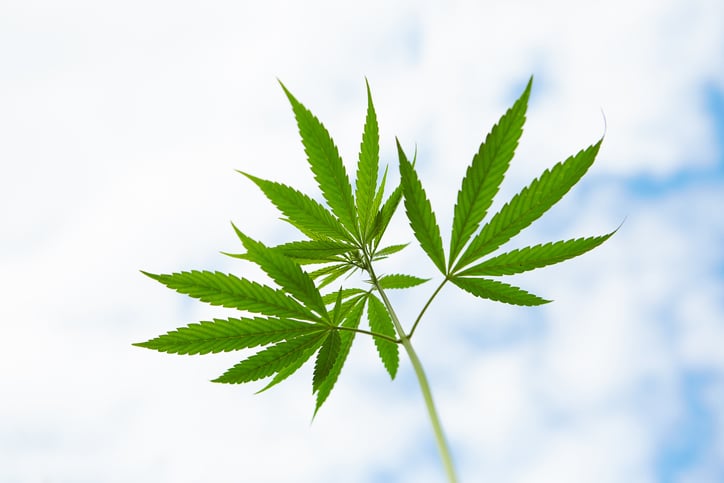What happened
Shares of cannabis companies Tilray (TLRY +0.00%), Cronos Group (CRON +0.40%), and New Age Beverages (NBEV +0.00%) dropped 19.4%, 14.8%, and 10.4%, respectively, in March, according to data from S&P Global Market Intelligence. For context, the S&P 500 rose 1.9% last month.
Those stocks have continued to struggle this month: through April 4, Tilray has fallen another 6.8%, Cronos edged down by almost 1%, and New Age lost 5.7%. The S&P 500 gained 2.3% over the period.
Tilray and Cronos are major Canadian marijuana growers, while New Age Beverages is a Denver- and Utah-based maker of coffees and teas, energy drinks, and other functional beverages. Last October, it entered the cannabidiol-infused beverage market. (CBD is a nonpsychoactive chemical found in the cannabis plant that is purported to have various medicinal benefits.)

Image source: Getty Images.
So what
We can attribute the trio's subpar March performances in part due to weakness in the sector. In general, cannabis stocks had a strong start to 2019 (Tilray is one notable exception), so pullbacks in the group weren't unexpected. Moreover, last month, many of the players released quarterly results that didn't excite investors, which contributed to the negative sentiment surrounding the sector.
Data by YCharts.
Tilray
On March 8, Jefferies initiated coverage of Tilray stock with an underperform rating. While investors shouldn't pay too much attention to the Street's stock ratings, changes in them can move prices. Tilray stock didn't head lower immediately in reaction to the Jefferies analyst's opinion, but the firm's action could have been one factor negatively affecting the share price later in the month.
On March 18, the Canadian cannabis grower released its fourth-quarter and full-year 2018 results. Shares fell 3.4% the next day, as investors apparently were somewhat underwhelmed. In Q4, as my colleague Keith Speights detailed, revenue soared 204% to $15.5 million, driven by the opening of the Canadian recreational market in October. While this metric easily beat the $14.2 million Wall Street consensus estimate, on the bottom line, the company fell short of expectations. Tilray reported a quarterly net loss of $31 million, or $0.33 per share. That compared poorly to its net loss of $3 million, or $0.04 per share, in Q4 2017, and was much worse than the $0.12 per share loss that analysts had been expecting.
Cronos
On March 26, Cronos released its Q4 and full-year 2018 results -- and the market was not pleased, pushing shares down by 9.9% at the close. For the quarter, net revenue landed at 5.6 million Canadian dollars, a 248% year-over-year increase, but well short of the CA$7 million that analysts had been looking for. The company also posted a quarterly loss of CA$11.8 million, compared to a profit of CA$667,000 a year earlier.
Moreover, Cronos stock racked up two Wall Street downgrades last month. On March 11, BMO Capital lowered its rating on the stock to underperform from perform. Then on the 27th, Canaccord Genuity downgraded it to a sell from a hold.
New Age Beverages
There were no notable announcements about New Age Beverages last month that could be deemed catalysts for its share price decline. In fact, the only significant news from the company was the March 29 release of its Q4 and full-year 2018 reports -- and the market apparently was at least satisfied with the numbers, as shares rose 2% on the news.
In the quarter, the company's net revenue increased 24% to $14 million, while its adjusted EBITDA (earnings before interest, taxes, depreciation, and amortization) loss doubled to $4.5 million, driven in part by costs associated with its $85 million acquisition of Morinda Holdings, which closed in December. This deal made New Age a much bigger company, and transformed it into an international player, as Morinda has operations in 60 countries.
It seems likely that New Age stock's pullback last month was a continuation of the profit-taking that began in February, during which the stock declined more than 17%, following its 36.7% run-up in January and 140% gain last year. Some investors could be jittery about increased competition in the CBD market, due to the passage of the U.S. Farm Bill, which became effective on Jan. 1. One section of that legislation made it legal to grow and process industrial hemp in all 50 U.S. states. CBD can be extracted from both hemp and marijuana.
The year-to-date picture
Despite March's pullbacks, Cronos stock is still having a great 2019, though shares of Tilray and New Age Beverages are down by low-double-digit and mid-single-digit percentages, respectively. We can largely attribute Cronos' robust performance to investor enthusiasm about the company's partnership with tobacco giant Altria (MO +0.39%). In early December, the two companies announced that Altria would buy a 45% stake in Cronos for approximately $1.8 billion (about 2.4 billion Canadian dollars). That purchase closed early last month.
Data by YCharts. By default, this chart includes after-hours trading on April 4.
Now what
In recent years, investors didn't need to be too careful about choosing a cannabis stock, as the growing legal cannabis market and investor enthusiasm about its future propelled many of the group's stocks higher. This rising-tide-lifts-nearly-all-boats dynamic is likely to change soon -- and perhaps this year -- as the players become more differentiated. So smart stock-picking should become more important.
Remember, the cannabis stock space is volatile and risky. Don't invest more money in these stocks than you can afford to lose.









